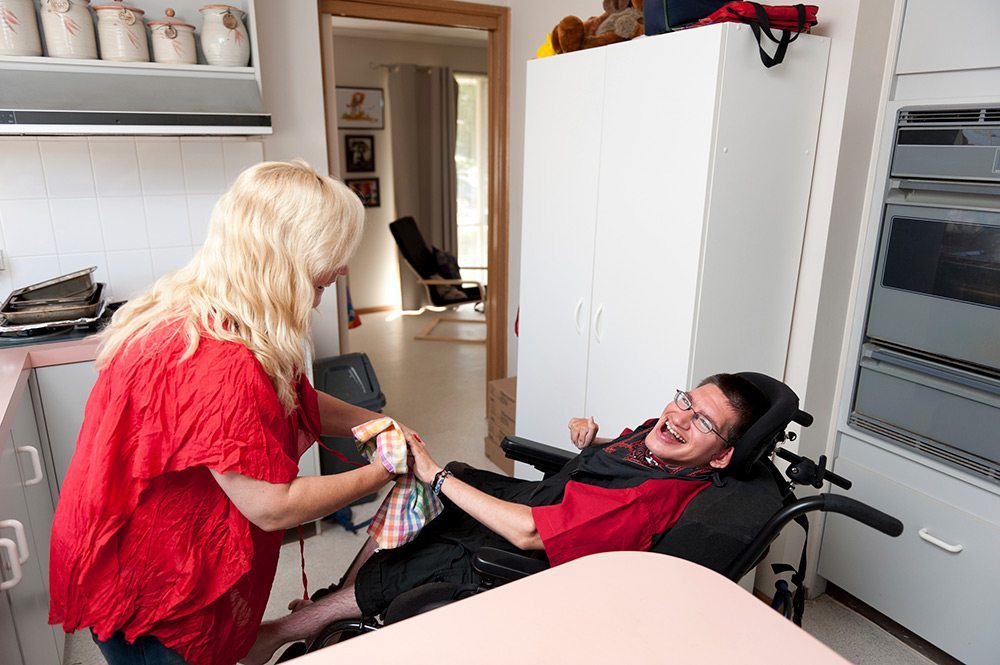The housing arrangements available to individuals with disabilities can vary vastly. In many cases, these individuals live at home in a family environment. Some individuals who are able to earn an income can have case managers or live in one of many different housing arrangements, such as supported living, assisted living, or community living.  A service description primer for adults with developmental disabilities can be found on the North Dakota Department of Human Services website and the Idaho DHS website. These sites cover the differences between congregate care, day supports, extended services, supported living arrangements, and minimally supervised living arrangements, among others. In many cases, individual state 211 services provide listings of care facilities, such as the Pennsylvania 211 Supportive Housing listing. HealthCentral also provides a general terminology breakdown of different housing types, while the Medical Home Portal provides a detailed description of available options and service providers.
A service description primer for adults with developmental disabilities can be found on the North Dakota Department of Human Services website and the Idaho DHS website. These sites cover the differences between congregate care, day supports, extended services, supported living arrangements, and minimally supervised living arrangements, among others. In many cases, individual state 211 services provide listings of care facilities, such as the Pennsylvania 211 Supportive Housing listing. HealthCentral also provides a general terminology breakdown of different housing types, while the Medical Home Portal provides a detailed description of available options and service providers.
There are several federal, state and nonprofit housing organizations that can provide assistance in selecting and locating appropriate housing for individuals with disabilities. These include:
- The United States Department of Housing and Urban Development (HUD), which administers the Housing Choice Voucher Program (also known as the Section 8 housing program) and the project-based public housing This program is specifically geared towards helping low-income families, the elderly or disabled individuals find affordable housing. The organization has local branches that can help you in your search for affordable housing, as well as a low-rent apartment search function.
- Section 811 is specifically geared towards helping individuals with disabilities, unlike the more generalized Section 8. Section 811 (the Supportive Housing for People with Disabilities Program) specifically develops and subsidizes rental housing for low- and very-low-income adults with disabilities. The advantage of this specific program is that it ensures that the housing units it subsidizes have access to supportive services, including case management and employment assistance. The Program provides a state-by-state listing of homes the program supports.
- Technical Assistance Collaborative, Inc. provides a comprehensive Federal Housing Resource Guide with information about public housing agencies, resources administered by state/local community development officials, and other important affordable housing resources.
- United Cerebral Palsy allows individuals to find local UCP affiliates that can help find local housing resources, though it also provides information on other services, such as employment and housing modifications.
- The ILRU is a federally-funded directory of centers that provide independent living services.
- Statewide Independent Living Councils’ SILC-NET publishes the ILRU Directory of Statewide Independent Living Councils (SILCs).
- The National Council on Independent Living (NCIL) provides individuals with information about local and statewide SILCs and CILs.
- The Association of Programs for Rural Independent Living (APRIL) provides support for independent living organizations specifically in rural areas.
- The U.S. Department of Health and Human Services Administration for Community Living (ACL) provides resources for individuals with disabilities seeking help in finding and using available community-based resources.
- The Home Affordable Modification Program (HAMP) helps individuals who need home modifications take out loans for items such as wheelchair ramps, safety bars and other modifications, such as lowered cabinets and handrails.
Check out this handy guide to types of rental housing subsidy programs.
